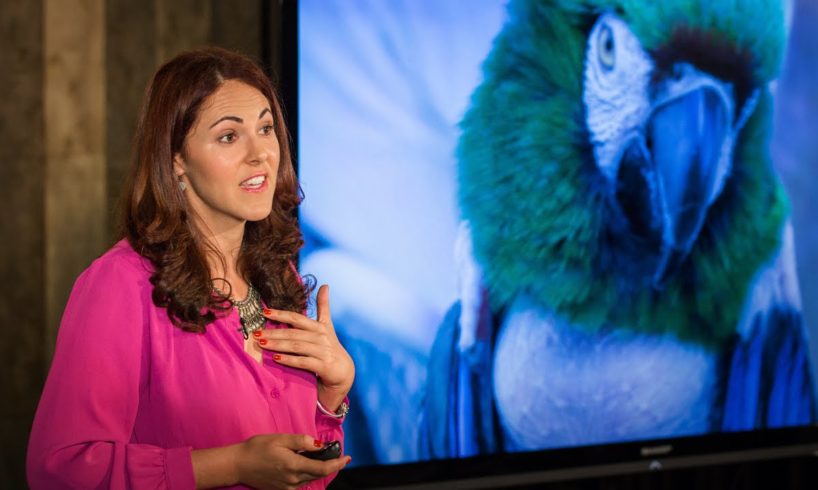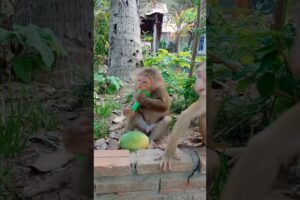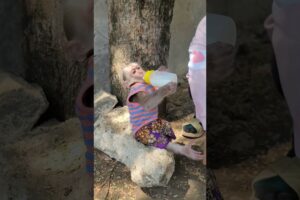
Behind those funny animal videos, sometimes, are oddly human-like problems. Laurel Braitman studies non-human animals who exhibit signs of mental health issues — from compulsive bears to self-destructive rats to monkeys with unlikely friends. Braitman asks what we as humans can learn from watching animals cope with depression, sadness and other all-too-human problems.
TEDTalks is a daily video podcast of the best talks and performances from the TED Conference, where the world’s leading thinkers and doers give the talk of their lives in 18 minutes (or less). Look for talks on Technology, Entertainment and Design — plus science, business, global issues, the arts and much more.
Find closed captions and translated subtitles in many languages at http://www.ted.com/translate
Follow TED news on Twitter: http://www.twitter.com/tednews
Like TED on Facebook: https://www.facebook.com/TED
Subscribe to our channel: http://www.youtube.com/user/TEDtalksDirector
source







Love it!!! This makes me see that we not only share similar physical anatomies but also psychological anatomies (or frameworks) with animals. It is as though humans and animals are part of a psychological ecosystem, and their survival actually depends on each other. Without realizing it, we are a diverse team/network, brainstorming solutions to the same problems, looking at different perspectives and approaches based on species.
If animals have complex minds or minds, we must stop eating them! It is a non sende to claim they have mental experiences amd then usea them as means to human ends. The solution is going vegan.
Full View just for you my sekai Sensei???
She's an awesome speaker. Great energy.
Autism is a hunter-mindedness over-load
Many of these TED talks are rather questionable, but this presentation was actually very well done, well organized, and well said.
Why…are these people laughing when she says her dog has OCD. Replace that "dog" with "friend" or "brother" and see how weird it is for them to laugh.
Beautiful talk.
Dogs are not smartest and not only sentient animals. Pigs have even more developed brains but they are violently slaughtered.
I loved the video 🙂 but I disagree with anthropomorphizing the animals; we should animalize the people!
I once waved at a little pig saying hello because I love animals and I like to interact with them. He was not nice at all and his look wasnt cute. later I found out his mother was killed close to him a week ago and that he heard everything.
A total false understanding of what ocd is and how it manifests
I am an active foster parent at Aggieland Humane Society, and I see mental illness in shelter animals all the time. Most of the animals that come through foster care have what we call "shelter shock" where the animal does not show normal animal socialization and interests such as staring at walls/corners, not playing with toys, or not being able to eat out of bowls. I've had dogs with PTSD regarding cars and men and other inanimate objects such as shoes or newspapers. It's hard to look at animals that have been through what these animals have and say they cannot possibly have mental illnesses such as human do.
I am a STRONG believer of treatment without medication. Like I said I have fostered many animals (well over 300 dogs and 100 cats) and I have never had to use medications for beneficial results. Time can do wonders! I also have had personal experience with medications such as SSRIs and SNRI on myself and I can honestly say that not all of them work well (or make things better). If there is an improper dosage or a weird side affect happening it is hard to see that in animals, so I would always suggest non medicational treatment first. I want to be clear that I am not stating to never use medications, I am just saying that some veterinarians are quick to jump to a pharmaceutical solution before trying other solutions. It never hurts to get a second medical opinion from other vets (:
what animal did she mention at 13:50?
This is a working breed, I don't think it's suited to living in an apartment. The inability to adjust sounds more like it's an issue with environment. I have a sneaking suspicion that should the animal live in the country and was put to work (this breed was developed to pull carts) he would not be "a mess." 🙁
có ai k!??vietsub đi!!!!!
The problem is "mental illness" is a term created to basically define behavior and activities that are rated as not useful to the social system in place. If you get someone very adapted to a certain environment and put them in a different setting, there you have a "mentally ill" person.
anybody else agree that she uses the "anthropomorphysing" reference far and away too much?
Awesome speach!
It's not "Burmese", it's a BERNESE Mountain dog. 😉
This is amazing. I actually searched this topic because my cat has always exhibited some very odd behavior. I think he may actually have a minor form of OCD which is strange because I've had him since he was a baby and I've always treated him very well. This expresses itself in a few benign but odd ritual behaviors. For one, he has never stopped purring, even when he sleeps and even directly after he was neutered. I know that might seem funny but it is absolutely compulsive. He also has a very strange ritual when it comes to drinking water. It's like he can't drink it from his water bowl, instead he dips his paws in it and eventually spreads it all over the floor but then he is just fine with lapping it up after he's made a mess. These aren't terrible issues by any means and otherwise he's a really happy and normal cat. I've never really even considered that animals can suffer from compulsive behaviors and mental disorders before today but now that I see this I am pretty well convinced that they can. I think that some animals, like my cat, might even be born with some of these strange quirks just like people sometimes are.
What irritates me most is the laughter in this audience. This is real, it is not funny..not funny for humans to have disorders, why dogs? Sigh
So much mental illness in pets is due to them being born as possessions and living as traded possessions.
wake up call, wild animals are not suppose to be pets or in a zoo!!! Exhibit A – the Bear, the Parrot, the Monkey….do you really think dogs want to fight war ?? get real!
Her dog has issues because something happen to him, she needs to talk to Cesar Milan, this is a weak presentation.
Makes me hate zoos even more.
Tift Merritt!? I love her!
The main problem with these animals is humans.. Do wild, none captive, animals also exhibit these behaviors..
"A righteous man regards the life of animals" – PROVERBS 12:10; "If you have men who will exclude any of God's creatures from the shelter of compassion & pity, you will have men who will deal likewise with their fellow men" – ST. FRANCIS OF ASSISI; "Never, never be afraid to do what's right, especially if the well-being of a person or animal is at stake. Society's punishments are small compared to the wounds we inflict on our soul when we look the other way." – MARTIN LUTHER KING, JR.; "I hope to make people realize how totally helpless animals are, how dependent on us, trusting as a child must that we will be kind and take care of their needs… (They) are an obligation put on us, a responsibility we have no rights to neglect, nor to violate by cruelty…." – JAMES HARRIOT; "The greatness of a nation & its moral progress can be judged by the way its animals are treated" – MAHATMA GANDHI
That was great, but very anecdotal, I wish there would have been a bit more facts about brains and hormones, but otherwise a really great and informative lecture.
Once you accept the theory of evolution it makes perfect sense that we share the same emotions with other animals.
This was great. Side note; how do you get 1,439 likes with only 99,323 views? lol
I loved this talk apart from when she said someone can't have a spiritual connection to animals, or something similar.
I believe that you can though…
She cares about animals and eats them?
I honestly forgot that many people see animals at the species level. I treat my pets like people… not human people, but individuals that react independently from another.
It seems obvious through this short talk that all of the "mental illnesses" she describes in animals are because of their unnatural environments — animals in captivity. Not once does she talk about seeing cases of OCD in bonobos in the wild, or pacing in tigers in the wild, or swaying elephants in Africa. Do they exist? If so, then yes, mental illness can be a genetic factor. However, if none can be found, all of these problems have been cultivated through human-imposed captivity. The drugs she talks about seem to be treating only the symptoms, not the source. Behavior therapy only goes so far when the trigger is constantly enveloping the animal.
This talk is kind of missing or even omitting an interesting topic: How mental issues can arise from an overprotective and unnatural environment. If an animal has a debilitating mental disorder in the wild, it dies. In captivity, it stays alive. Same with humans.
If natural selection had any weight, mental disorders would be far less frequent. Because the mentally unstable, do not survive. If someone else "does the surviving for them" of course we will see many interesting traits.
I loved this one. I think I'm going to look into buying her book. I like that shes compassionate about animals.